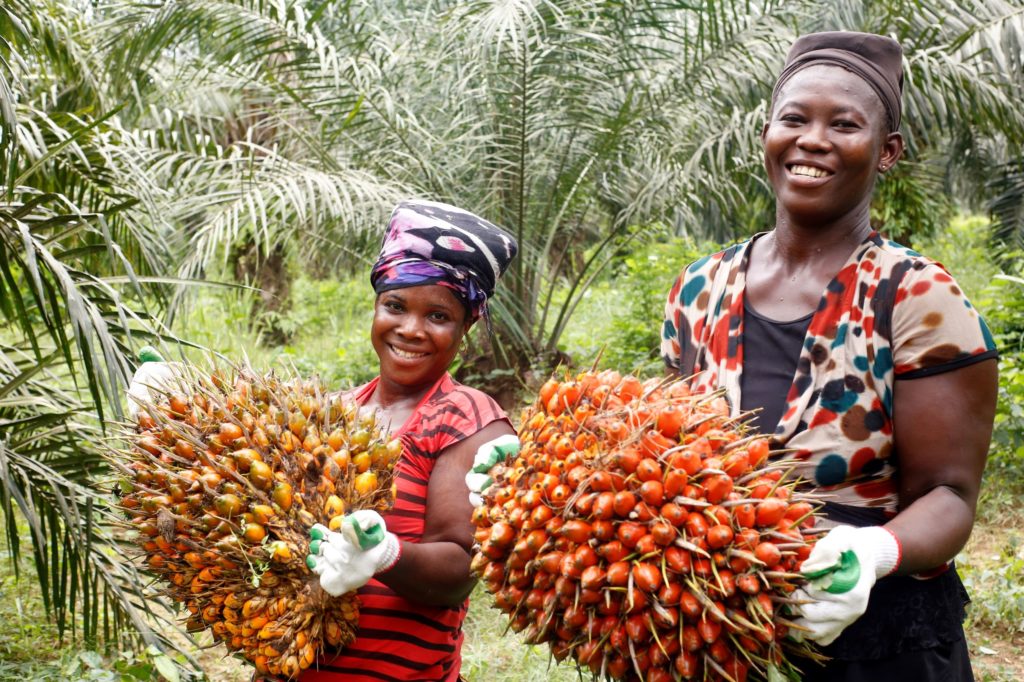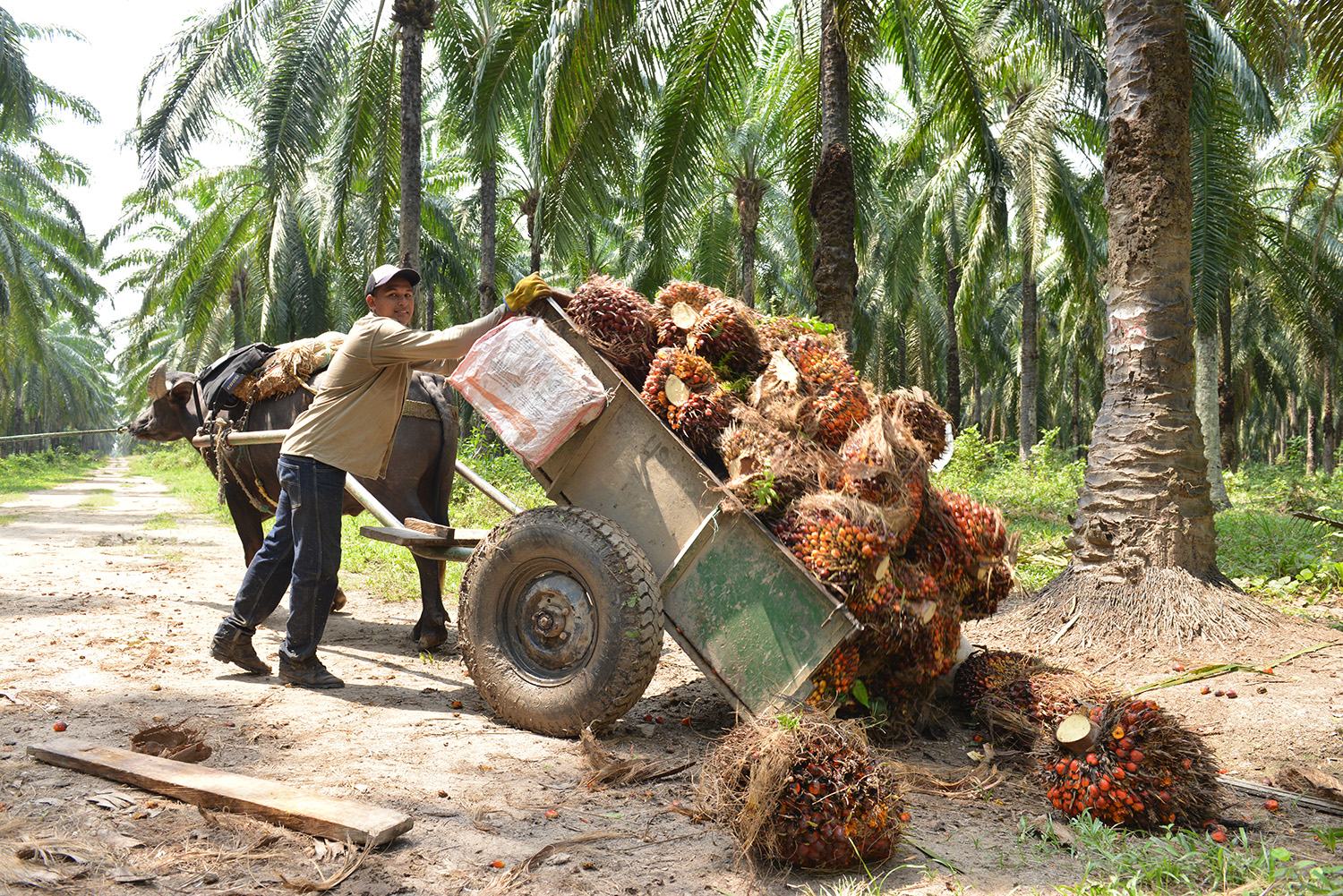The first global Palm Oil Barometer by Solidaridad and smallholder producer organizations in Asia, Africa and Latin-America, gives a new perspective on the largely negative public debate around palm oil in western countries. This controversial crop presents more issues and more opportunities than many people realise.
Deforestation and poverty are interlinked
Palm oil production figures prominently in the media as a cause of deforestation, biodiversity loss and climate change. However, by isolating its impact on the environment from the poverty crisis, to which it is directly linked, it’s easy to overlook the vital role smallholders play in palm oil production. Although the image of large companies growing vast expanses of oil palms as a monoculture holds true, more than three million smallholders and their families produce roughly 30 percent of the world’s palm oil. And a multitude of workers find jobs in oil palm production. In Indonesia alone there are around 16 million workers in the palm oil sector, of which the majority is employed by smallholders. The contribution of smallholders in the overall supply of palm oil is only expected to increase, as industrial scale companies are forced to limit expansion due to zero-deforestation commitments.
Smallholders produce not even 2% of certified sustainable palm oil on the market, while contributing 30% of the world’s supply. Governments and businesses must make smallholder inclusion part of their sustainability criteria.
Shatadru Chattopadhayay, managing director Solidaridad Asia
Shatadru Chattopadhayay, managing director Solidaridad Asia reflects: “Smallholders produce not even 2% of certified sustainable palm oil on the market, while contributing 30% of the world’s supply. Governments and businesses must make smallholder inclusion part of their sustainability criteria.”
In the multi-billion dollar palm oil industry, smallholder farmers do not get their fair share
Smallholders generated USD 17 billion of the palm oil industry’s USD 282 billion turnover in 2020, yet many did not earn enough to cover their families’ essential living costs. Despite this, many smallholders prefer growing oil palm to other crops, like rubber or coffee, because they earn a higher and more consistent income throughout the year. For many smallholder farmers growing oil palm gives them better prospects and alleviates poverty.
It’s getting more and more difficult for farmers with all these changes in the prices. Some feel as if 50 percent of their livelihood has been lost as the prices of the fresh fruit bunches have been slashed.
Valens Andi, head of a farmers’ cooperative in West Kalimantan, Indonesia
Multiple factors can influence a farms’ profitability, including its size, labor and fertilizer costs, market access, and prices. Volatile market prices squeeze smallholder margins that are already narrow. “It’s getting more and more difficult for farmers with all these changes in the prices. Some feel as if 50 percent of their livelihood has been lost as the prices of the fresh fruit bunches have been slashed and, at the same time, the price of fertilizers and pesticides have risen by more than 100 percent” said Valens Andi, head of a farmers’ cooperative in West Kalimantan, Indonesia, to Al-Jazeera. Faced with these precarious conditions many smallholders are unable to invest in farm-level innovations or adhere to sustainability standards. By 2030 Indonesian smallholder plantations will account for around 60 percent of the country’s oil palm area. Supporting these smallholders to produce sustainably will be a key challenge in the coming years.

Fair value distribution is at the heart of sustainable palm oil production
While smallholders struggle to make ends meet, at the other end of the chain food manufacturers, consumer goods companies and retail take 66 percent of the gross profits on palm oil in food, household, and body care products. The focus on cost-cutting to optimize profits contrasts starkly with individual companies’ sustainability commitments, as well as the global climate and UN’s Sustainable Development Goal agendas. The concern is that global palm oil buyers show little willingness to compensate small producers for operating sustainably, for example, by paying a fair price and investing in long-term trading relationships. A fairer value and risk distribution across the palm oil value chain enables farmers to both produce sustainably and make an income that sustains their family’s livelihood.
Stop boycotting and start investing in good palm oil production
Smallholder interests are not only overlooked in the value chain, their role and interests are also ignored in the public debate. Campaigns by NGOs and commercial brands call for a palm oil boycott to combat biodiversity loss. Many academics and conservation organizations agree that banning palm oil would simply shift the problem elsewhere, threatening other habitats and species. Oil palm is far more productive than any other vegetable oil crop. For example, on average, it’s five times more productive than soy. Replacing palm oil with alternatives would intensify the battle for scarce farmland. Instead of boycotting palm oil, the industry should invest in sustainable palm oil production by smallholders.
Bring smallholder voices to the fore
Farmers’ organizations should play a key role in the debate on the future of palm oil farming. Focusing on fair value distribution and minimizing environmental degradation is key. The private sector and governments need to move from technical assistance to programmes that address the structural disadvantages at smallholder farm level. Solutions will not be the same everywhere and have to be found in a combination of voluntary and mandatory approaches.
Companies and governments in consuming and producing regions must include smallholders’ interests when developing and implementing policies.
Heske Verburg, managing director Solidaridad Europe
Heske Verburg, managing director Solidaridad Europe recommends that “companies and governments in consuming and producing regions must include smallholders’ interests when developing and implementing policies. The EU should ensure that smallholders will be supported to meet the requirements of the EU Regulation on deforestation-free products and in partnership with producing countries tackle the root causes of deforestation, including poverty.”

